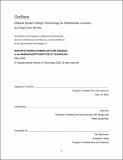OurStory : Dispute System design technology for stakeholder inclusion
Author(s)
Mendler, Bridgit Claire.
Download1193024880-MIT.pdf (12.15Mb)
Alternative title
Our Story : Dispute System Design technology for stakeholder inclusion
Dispute System Design technology for stakeholder inclusion
DSD technology for stakeholder inclusion
Other Contributors
Program in Media Arts and Sciences (Massachusetts Institute of Technology)
Advisor
Deb Roy.
Terms of use
Metadata
Show full item recordAbstract
Sometimes we find ourselves within institutions of which we have no influence, witnessing avoidable mistakes, harms and failures. Or sometimes we are in positions of influence in such institutions, surprised by the discontent of those we lead. When knowledge and experience is not shared, institutional systems do not learn and adapt as well as they should, nor gain the necessary buy-in from those they are designed to serve. A process for gathering stakeholder input and putting it to use is necessary to create responsive and resilient systems. One such process that has demonstrated effectiveness is Dispute System Design (DSD). DSD is a process for redesigning ineffective dispute systems or designing new ones from scratch. This process upholds the value of stakeholder participation and has seen successful results across varied use cases from international peace process negotiations to redesigning dispute resolution procedures in large private enterprises. However, there are still many institutional systems that would stand to benefit from such a process that do not yet because it is taxing on time and requires specific expertise. Technology can play a role in making it easier to participate in DSD processes remotely and making the complex work more comprehensible through visualization techniques for mental model alignment. These improvements would enable more stakeholder inclusion in DSD which in turn will improve epistemic outcomes and improve buy-in for design solutions. In this thesis, we design, build, and evaluate a tool that aims to improve stakeholder inclusion in the DSD process. To address existing constraints on stakeholder inclusion in the DSD process, this tool enables remote participation in DSD focus groups and provides an interactive visual reference map of dispute systems to facilitate mental model alignment. We tested our tool within a DSD context and a non-DSD context to evaluate our hypothesis that through the use of novel supportive technology, DSD processes can reach a broader audience.
Description
Thesis: S.M., Massachusetts Institute of Technology, School of Architecture and Planning, Program in Media Arts and Sciences, May, 2020 Cataloged from the official PDF of thesis. Includes bibliographical references (pages 89-94).
Date issued
2020Department
Program in Media Arts and Sciences (Massachusetts Institute of Technology)Publisher
Massachusetts Institute of Technology
Keywords
Program in Media Arts and Sciences